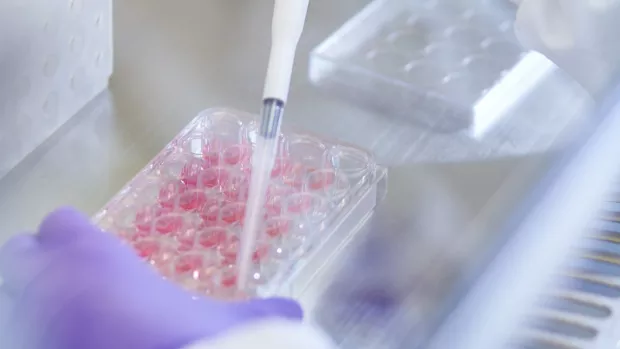
Meet the researchers connected by their goal to stop progression
Researchers An, Valeria and Simon are thousands of miles apart. But they all share the same goal: to solve the mystery of what causes MS progression.
All three work on projects supported by the International Progressive MS Alliance, which we’re a founding member of. They told us about their research.
Immune cells: Professor An Goris and team at KU Leuven in Belgium
"It’s well known that people with MS all experience the condition differently. Everyone will have different symptoms and progress at different rates. We think these differences could be caused by a type of immune cell, called microglia.
Knowing which immune cells contribute to progression, and when, will help us fine-tune current MS therapies.Professor An Goris
Their level of activity early on in MS could influence - and even predict - how someone’s MS might progress. So we’re looking at disability scores from people over the whole course of their MS. And using state-of-the-art lab technology to see if the type of immune cells they have could've influenced how their MS progressed.
We might be able to use this knowledge to predict the course of someone’s MS at the time of their diagnosis. And knowing which immune cells contribute to progression, and when, will help us fine-tune current MS therapies. It could even open up new potential treatment targets in the immune system."
Read more about the important immune cells in MS
Nerve cell connections: Dr. Valeria Ramaglia at University of Toronto in Canada
"People living with MS experience major cognitive issues including memory problems. Within the lab of Prof. Jennifer Gommerman, our team looks at different brain regions. This includes the hippocampus – an important part of the brain that allows us to remember things.
The hippocampus has millions of connections between its cells called synapses. These allow brain cells to talk to each other. But in MS we think the immune system mistakenly destroys these synapses, causing memory problems. We’re using brain tissue donated by people with MS to uncover what triggers this destruction.
If we identify which part of the immune system causes the destruction of synapses,
we could develop strategies to prevent or reverse it.Dr. Valeria Ramaglia
New technology, called imaging mass cytometry, is allowing us to look at brain immune cells in intricate detail. We also have extensive data from each brain donor. This allows us to link the amount and characteristics of their brain immune cells with other attributes of MS. For example, how long they’ve had MS or the number of lesions in their brain.
If we identify which part of the immune system causes the destruction of synapses, we could develop strategies to prevent or reverse it. We have synapses throughout our brain, so it could help more than just cognitive symptoms of MS."
Read more about other discoveries made using donated brain tissue
Mitochondria: Dr Simon Licht-Mayer at University of Edinburgh in UK
"In our lab, we’re looking at a new way to protect nerves from damage. When myelin (the protective coating around our nerves) is damaged by MS, nerve cells need a lot more energy to survive. They need energy to try and repair, and it takes more effort to send messages around the body.

I hope pioglitazone or other drugs that target this natural response of mitochondria prove to be effective in clinical trials.Dr Simon Licht-Mayer
During my PhD I found, when myelin damage happens, energy-making organisms called mitochondria (my-toe-kon-dree-uh) move into the area. It’s a bit like giving the cell an extra battery pack. They give more energy to the nerve and can prevent further damage from happening.
We found a diabetes drug called pioglitazone could boost this natural process and protect nerves in mice. Now we’re seeing whether it’s safe to use this treatment in the long-term. And, whether inflammation could change how well the response works.
I hope pioglitazone or other drugs that target this natural response of mitochondria prove to be effective in clinical trials. It could be used as an add-on therapy to save vulnerable nerve cells and stop progression of MS."
This article originally featured in MS Matters Summer 2022




